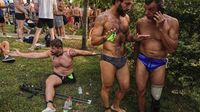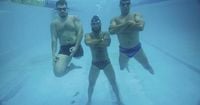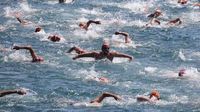On August 24, 2025, the waters of the Bosphorus Strait shimmered with more than just the reflections of Istanbul’s ancient skyline. They carried the grit, determination, and hope of three Ukrainian war veterans—Oleh Tserkovnyi, Pavlo Tovstyk, and Oleksandr Dashko—who plunged into the 6.5-kilometer open-water race from Asia to Europe, not just to test their physical limits but to send a message of resilience to the world. Their crossing, completed on Ukraine’s Independence Day, was both a personal triumph and a public reminder of the enduring toll of war.
According to the Associated Press, the idea was born months earlier, during a pool training session. Oleh Tserkovnyi, a 34-year-old veteran and triathlete, wondered aloud to his support group One for Another: what if they swam the Bosphorus on August 24, the very day Ukraine marks its independence? The symbolism was unmistakable—a swim linking continents, drawing the world’s gaze to the devastation wrought by Russia’s ongoing war on Ukraine, now in its fourth year.
When Tserkovnyi proposed the idea, his fellow veterans didn’t let their injuries—especially their amputations—stand in the way. Two others, Pavlo Tovstyk and Oleksandr Dashko, joined him immediately. With support from Ukraine’s Superhumans Center for War Trauma and coaching by CapitalTRI, an amateur triathlon team in Kyiv, the trio embarked on months of rigorous training. Their goal wasn’t just to cross the strait; they aimed to raise money for prosthetics, which remain both costly and urgently needed by Ukraine’s wounded.
“We’re not asking for pity,” Tserkovnyi told The Associated Press before the race. “We’re asking for support.”
The Bosphorus Intercontinental Swimming Race, organized annually by the Turkish Olympic Committee since 1989, is a formidable test of endurance, drawing over 2,800 swimmers from 81 countries this year. For the Ukrainian veterans, though, the event was about more than athletic achievement. It was about reclaiming agency over bodies changed by war—and sharing their journey of recovery with a world that sometimes seems indifferent to their scars.
Their path to the starting line was not without obstacles. Two of the veterans, both amputees, were initially barred from competing in the main category, with organizers insisting they join a separate group for athletes with disabilities. But the men were determined to compete on equal terms. According to the Superhumans Center, they deliberately chose not to indicate their disabilities when registering, making it a matter of principle to complete the distance alongside everyone else. The day before the race, they faced potential disqualification, but ultimately, they were allowed to swim.
All three completed the crossing, each swimming for more than an hour. Their times were remarkable: Pavlo Tovstyk finished in 1 hour and 23 minutes, Oleh Tserkovnyi in 1 hour and 24 minutes, and Oleksandr Dashko in 1 hour and 30 minutes, as reported by Ukrainska Pravda and the Superhumans Center. “This is not just about sport. It’s about recovery after the war, about strength of character, and an example for all of us. Thank you for inspiring us!” the Superhumans Center wrote on Facebook.
Each swimmer’s story is a testament to the power of resilience. Tserkovnyi, who survived two severe concussions from artillery fire while serving as a sniper on the front lines, now lives with significant hearing loss and no peripheral vision on one side. He still experiences a stutter and involuntary twitching in his eye, lingering reminders of his injuries. “Sport itself heals—we’ve seen that firsthand,” he said to the Associated Press. “And the community, it pulls you through. It pushes you, it disciplines you.”
For Tserkovnyi, swimming became a bridge back to life. He described how the pool helped him recognize and manage PTSD symptoms, including flashbacks to the war. “I began to understand what triggers them, when they come, and how to stay ahead of them,” he explained.
Pavlo Tovstyk, a 47-year-old engineer, volunteered for Ukraine’s defense shortly after Russia’s full-scale invasion in February 2022. Serving as a driver in an intelligence unit, Tovstyk stepped on a landmine in June 2023, losing his foot and undergoing a partial amputation of his left leg. Despite his injuries, he returned to swimming just two months after the blast, initially keeping his pool sessions secret from his doctors. “Water became a kind of savior for me,” Tovstyk told the Associated Press. “At the time, everything felt disoriented. But in the water, my thoughts, my strength, my body—it all came together again. I became myself again. Just ... different.”
For Tovstyk, the challenge of crossing the Bosphorus was as much mental as physical. “To cross the Bosphorus, you need not just physical strength, but a certain mindset—a state of determination that all of us managed to find within ourselves,” he said.
Oleksandr Dashko, at 28, discovered swimming only after losing his left leg above the knee to a mine explosion in June 2023. He had joined the military at the outbreak of the Russian invasion and served in the infantry on the front lines. The adjustment to life with an amputation was slow and mentally taxing. Dashko admitted, “I didn’t take it very graciously, let’s say,” reflecting on the inner turmoil that followed his injury. It was only in the past year, through physical rehabilitation and swimming, that he regained a sense of calm and purpose. “When I do nothing, I slip back to that state right after the injury—depression, apathy, the feeling that the amputation is winning,” he said. “But when something like this shows up on my path, it gives me a jolt—to live, to move forward, to motivate others.”
Dashko’s journey of recovery has included other remarkable feats; earlier in 2025, he climbed to Everest Base Camp. For him, physical goals are anchors. “Honestly, if it weren’t for this, I’d probably be drunk and lying under a fence somewhere,” he told the Associated Press, highlighting how sport and challenge have kept him moving forward.
The veterans’ swim was more than a personal victory. It was a public demonstration of the strength of character forged by adversity and a call for global support. Their participation, on Ukraine’s Independence Day, shone a spotlight on the ongoing need for prosthetics and rehabilitation for wounded Ukrainians, even as the war continues to reshape lives far from the battlefield.
As the Bosphorus currents carried them from Asia to Europe, the world watched—not just in admiration of their athleticism, but in recognition of their courage, their message, and the unbreakable spirit they represent.



